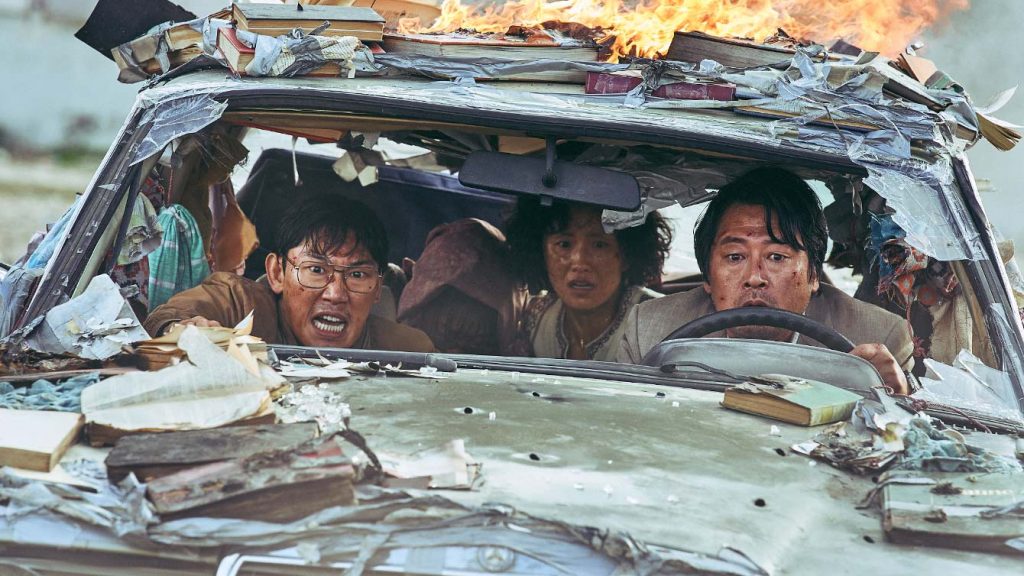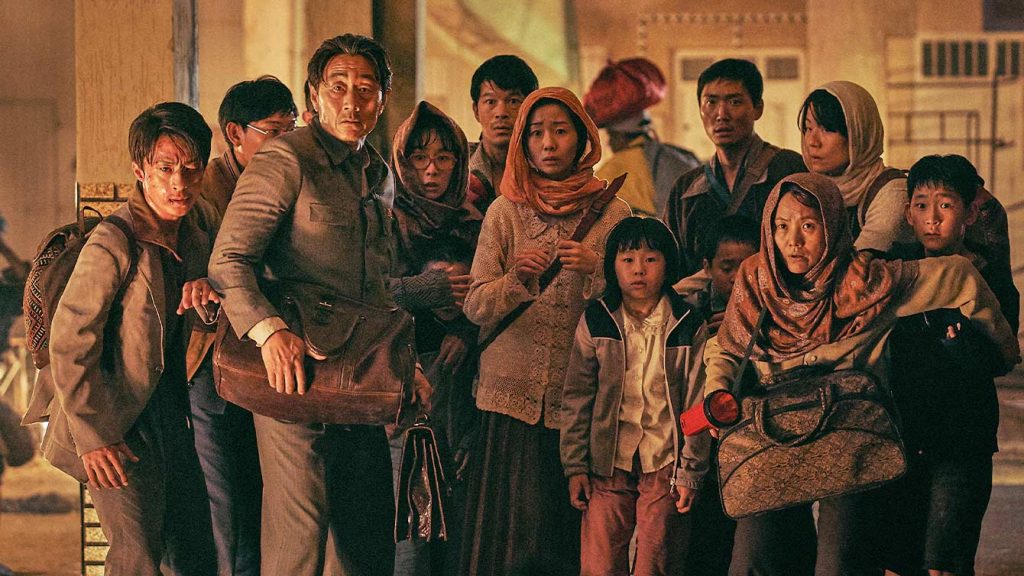August 27, 2021
by Carla Hay

Directed by Ryoo Seung-wan
Korean, Somali and English with subtitles
Culture Representation: Taking place from November 1990 to January 1991, primarily in the Somali capital of Mogadishu and briefly in Kenya, the dramatic film “Escape From Mogadishu” features a cast of primarily Asian and African people (with a few white people) representing Korean government officials, their families and Somalis caught up in Somalia’s civil war.
Culture Clash: Government officials and diplomats from rival North Korea and South Korea are trapped in Mogadishu during a violent civil war outbreak, and the Koreans must decide if they should put aside their North Korean/South Korean conflicts to work together to escape from Mogadishu.
Culture Audience: “Escape From Mogadishu” will appeal primarily to people who are interested in watching tense political thrillers about international relations stories that are rarely told on screen.

In the dramatic film “Escape From Mogadishu,” there are two types of political conflicts going on—a civil war in Somalia and a feud between North Korea and South Korea. This compelling and action-filled movie shows what happens with Koreans who are caught in the middle of these two conflicts. “Escape From Mogadishu” (directed by Ryoo Seung-wan) is fictional, but it could easily have been inspired by real events.
The beginning the movie —which takes place from November 1990 to January 1991—has a captioned statement explaining the tension that will be depicted. During this time, South Korea (a democratic country) and North Korea (a Communist country) had not been approved for United Nations membership. Somalia was a crucial deciding nation on the vote to approve membership. North Korea had been lobbying for Somalia’s United Nations membership vote since the early 1970s, while South Korea didn’t send any diplomats to Somalia until 1987.
In “Escape From Mogadishu,” two diplomatic leaders for South Korea and North Korea are bitter competitors, who are jockeying for power and influence with Somali government officials while Somalia is in the midst of a civil war. But when a violent outbreak in Mogadishu traps the two diplomats, their colleagues and their families, it forces the diplomats to decide if their North Korean/South Korean feuding can be overcome to work together for an escape, or if they should remain enemies and only concern themselves with helping their fellow citizens.
“Escape From Mogadishu” spends the first half of the movie establishing the main characters and showing how the North Korean/South Korean diplomat rivalry unfolds and becomes increasingly hostile. The movie is told mainly from the perspective of the South Koreans—chiefly, Ambassador Han Shin-sung (Kim Yoon-seok), a somewhat nervous and by-the-book diplomat, who arrives in Mogadishu with high hopes but some trepidation. Ambassador Han is accompanied by Secretary Gong Soo-chul (played by Joung Man-sik), a somewhat goofy and bumbling lackey.
The two diplomats meet up with Counselor Kang Dae-jin (played by Zo In-sung), an arrogant lawyer who will do whatever it takes to seal the United Nations deal for South Korea. For their lodging, they are all staying at a South Korean-owned diplomat building, along with Ambassador Han’s wife Kim Myung-hee (played by Kim So-jin), Clerk Jo Soo-jin (played by Kim Jae-hwa) and Clerk Park Ji-eun (played by Park Gyeong-hye). Because the building is owned by South Korea, this property ownership plays a role in what happens later in the movie, when it comes to who can be legally protected in the building.
There’s some comic relief in the beginning of the film when Ambassador Han expresses disapproval at the haphazard way that Counselor Kang has arranged South Korea’s gifts to Somali government officials. Counselor Kang has thrown together as gifts some random items in a suitcase, including some liquor and a VHS video of the 1988 Olympics ceremony in Seoul. Ambassador Han scolds Counselor Kang because the gifts are unwrapped, which Ambassador Han thinks makes the gifts look even tackier. Ambassador Han is also annoyed that liquor is one of the gifts, because he thinks it might be insensitive or offensive to Muslim culture that discourages drinking of alcohol.
The North Korean chief diplomat in this story is Ambassador Rim Yong-su (played by Huh Joon-ho), whose right-hand person is Counselor Tae Joon-ki (played by Koo Kyo-hwan). In stark contrast to nervous and emotional Ambassador Han, the demeanor of Ambassador Rim Yong-su can be described as cold, calculating and ruthless. Ambassador Han wants to make ethical deals, while Ambassador Rim Yong-su seems to have dubious ethics. The two men have inevitable arguments.
It doesn’t take long for a violent act to occur. Soon after Ambassador Han and Secretary Gong Soo-chul have met up with Counselor Kang, the three of them are riding in a rented car on the way to an important meeting with a Somali government official. They get stopped and robbed at gunpoint by four Somali rebel soldiers, who oddly don’t want the car or any money. Instead, the robbers steal the suitcase containing the diplomatic gifts.
This theft immediately makes Ambassador Han suspicious. He suspects that Counselor Kang leaked the information and set up this robbery. Counselor Kang denies it, but trust has been broken. Ambassador Han decides that Counselor Kang will not be part of the meeting and that only Ambassador Han and Secretary Gong Soo-chul will go to the meeting, for which they are already running late because of the robbery.
It’s a race against time for Ambassador Han and Secretary Gong Soo-chul to make it to the meeting, but they are 15 minutes late. To their crushing disappointment, they find out that because they were tardy, the Somali government official has already moved on to his next appointment. And the appointment is with North Korean rival Ambassador Rim Yong-su.
As a consolation, Ambassador Han is told he can meet with an aide/speechwriter of the Somali official. Ambassador Han has an uncomfortable meeting with the aide, who essentially tells Ambassador Han that he can influence his boss to vote for South Korea, if the aide is given a hefty bribe. He asks for $50,000, because he wants $25,000 for each of his two sons’ tuition because his sons will be studying industrial technology in the United States.
The aide says that the bribe can be laundered as a donation labeled as money for a “training fellowship.” Ambassador Han balks at this suggestion. But the ambassador begins to wonder if he will fail in his mission to secure Somalia’s United Nations vote for South Korea, when the aide tells him that North Korea will most likely agree to the bribe.
Ambassador Han will have bigger things to worry about than deciding if he should bribe a government aide. Mogadishu soon comes under attack from a massive rebel insurrection. There’s mad rush to get back to the South Korean diplomat building, which isn’t easy because chaos quickly descends throughout the city. And it soon becomes apparent that it’s too unsafe to stay in Mogadishu.
While trying to figure out how to get his small group of South Korean citizens out of Mogadishu, Ambassador Han comes across a major dilemma: Ambassador Rim Yong-su asks for Ambassador Han’s help in sheltering Ambassador Rim Yong-su and the approximately 15 or 16 North Koreans, including some underage children, who are with Ambassador Rim Yong-su. A decision will also have to be made about which group of Koreans will have to renounce their citizenship and pretend to be part of the other group, in order to be rescued.
“Escape From Mogadishu” (which was actually filmed in Morocco, not Somalia) has plenty of pulse-pounding and suspenseful moments that accelerate to a very dramatic conclusion. There’s realistic violence in the movie, but it’s not over-the-top gratutitous. The movie also depicts in some heartbreaking ways how child soldiers are trained to kill. But fortunately for very sensitive viewers, there are no scenes of children actually killing other people. But the potential is there, and there’s a moment where someone has a very close call with two child soldiers.
All of the principal cast members give solid performances, with Kim Yoon-seok doing an admirable job as the flawed but sincere ambassador who finds out that he’s braver than he thought he was. “Escape From Mogadishu” effectively shows how quickly life in a war-torn country can take a turn for so many innocent people caught in the middle of an insurrection. The movie is also a riveting look at North Korean and South Korean identities. And it’s a memorable depiction of what people will or will not do to hold on to patriotic allegiances when there are life-or-death decisions to be made.
Well Go USA released “Escape From Mogadishu” in select U.S. cinemas on August 6, 2021. The movie was released in Korea on July 28, 2021. “Escape From Mogadishu” will be released on digital on October 19, 2021. The movie’s release on Blu-Ray and DVD is on January 18, 2022.


